- Home
- Linwood Barclay
The Twenty-Three 3 (Promise Falls) Page 2
The Twenty-Three 3 (Promise Falls) Read online
Page 2
Whoever’d done that was still out there.
The Lydeckers had not just sat around doing nothing the last four days. They’d been out every day, driving around town, going out to the college, popping into local bars, checking back in with George’s friends. They felt they had to be doing something.
They’d been back to the police, too, who were finally starting to take this more seriously. On Thursday, they sent around a detective named Angus Carlson. He sat down with the parents and Cassandra, made notes. He even took Cassandra aside later, said he wondered if she might know anything about her brother that she wouldn’t want to say in front of her parents. Something that might help him find George.
“Well,” she’d said, “he likes to break into people’s garages and look for stuff.”
“Do your parents know about that?”
Cassandra had shaken her head no. Said maybe she should tell them.
Carlson had made a note.
And now here it was, Saturday morning. Hillary and Josh in the kitchen, Cassandra upstairs in bed. Hillary had been down here since five, making a pot of tea, and then drawing up a list of things they should do today in their search for George.
The list, so far, read:
• call Detective Carlson, update
• call friends again. D. Cutter
• check places George might explore, abandoned factories, Five Mountains park, drive-in disaster
• make flyers with George picture, put up around town, call printer
When Josh entered the room, Hillary had turned on the kettle to make another pot of tea. She showed her husband the list.
“Okay,” he said wearily. “I’d been thinking about Five Mountains. I could imagine him looking around there, now that it’s closed down. It’ll probably be all locked up. I could call the management, or maybe get the detective to do that.”
“George would find a way in, even if it was locked. You know what he’s like. He’s always sneaking into things.”
Josh hesitated. “About that. Cassie told me something, last night.”
“Told you what?”
“Sometimes . . . sometimes George breaks into places. Not like a school or something, just goofing around. He looks for unlocked garages, gets in, takes stuff.”
“He does not,” Hillary said angrily. Her face had become flushed, and beads of sweat had sprouted on her forehead.
“I’m just telling you what she said. I think . . . at first I didn’t want the police brought in, in case George had done something stupid, but I’m past that. We should ask them if there have been any break-ins. Of garages. Maybe that would be a lead to finding out what—Hillary, are you okay?”
“Seriously?” Hillary said. “I’ve had three hours’ sleep this week. Now you’re saying my son is a thief, and you ask if I’m okay?”
“I’m just saying, you don’t look good.”
“I can’t sleep, I’m worried sick about what’s happened to my baby, I feel like I’m going to have a heart attack, and—”
Hillary’s cell phone, which was on the table next to her cup of tea, vibrated. A text.
“Oh my God, maybe it’s George!” she said, and dived for the phone, snatched it up, looked at it with puzzlement. “It’s Cassie.”
“Cassie?” Josh said. “She’s upstairs.” He hesitated. “Isn’t she?”
Hillary, her face crumpling, turned the phone to her husband.
The text read:
I think I’m dying
• • •
Ali Brunson said, “Hang in there, Audrey. You’re going to be fine. You just have to keep it together a little bit longer.”
Of course, Ali had said that many times in his career as a paramedic, and there were many of those times when he hadn’t believed it for a second. This looked as though it was turning into one of those times.
Audrey McMichael, age fifty-three, 173 pounds, black, an insurance adjuster, resident of 21 Forsythe Avenue for the last twenty-two years, where she lived with her husband, Clifford, was showing every indication of giving up the fight.
Ali called up to Tammy Fairweather, who was behind the wheel of the ambulance, and racing it to Promise Falls General. The good news was, it was early Saturday morning and there was hardly anyone on the road. The bad news was, it probably wasn’t going to matter. Audrey’s blood pressure was plummeting like an elevator with snapped cables. Barely sixty over forty.
When Ali and Tammy had arrived at the McMichael home, Audrey had been vomiting. For the better part of an hour, according to her husband, she had been complaining of nausea, dizziness, a headache. Her breathing had been growing increasingly rapid and shallow. There had been moments when she’d said she could not see.
Her condition continued to deteriorate after they loaded her into the ambulance.
“How we doing back there?” Tammy called.
“Don’t worry about me. Just get us to church on time,” Ali told her, keeping his voice even.
“I know people,” Tammy said over the wail of the siren, trying to lighten the mood. “You need a ticket fixed, I’m the girl to know.”
The radio crackled. Their dispatcher.
“Let me know the second you clear PFG,” the male voice on the radio said.
“Not even there yet,” Tammy radioed back. “Will advise.”
“Need you at another location ASAP.”
“What’s the deal?” Tammy asked. “All the other units take off sick? They go fishing for the weekend?”
“Negative. All engaged.”
“What?”
“It’s like an instant flu outbreak all over town,” the dispatcher said. “Let me know the second you’re available.” The connection ended.
“What’d he say?” Ali asked.
Tammy swung the wheel hard. She could see the blue H atop Promise Falls General in the distance. No more than a mile away.
“Something going around,” Tammy said. “Not the kind of Saturday morning I was expecting.”
Whenever Tammy and Ali got the weekend morning shifts, they usually started them with coffee at Dunkin’s, chilling out until their first call.
There’d been no coffee today. Audrey McMichael, it turned out, was their second call of the day. The first had been to the Breckonwood Drive home of Terrence Rodd, an eighty-eight-year-old retired statistician who’d called 911 after experiencing dizziness and chest pains. Tammy had pointed out that he lived right next door to where that Gaynor woman had been murdered a few weeks ago.
Terrence never made it alive to the ER.
Hypotension, Ali thought. Low blood pressure.
And here they were again, with another patient experiencing, among other things, dangerously low blood pressure.
Ali raised his head far enough to see out the front window just as Tammy slammed on the brakes and screamed, “Jesus!”
There was a man standing in the path of the ambulance, halfway into their lane. “Standing” was not quite accurate. More like stooping, with one hand on his chest, the other raised, palm up, asking the ambulance to stop. Then the man doubled over, and vomited onto the street.
“Goddamn it!” Tammy said. She grabbed her radio. “I need help!”
“Drive around him!” Ali said. “We don’t have time to help some geezer cross the road.”
“I can’t just—he’s on his knees, Ali. Jesus fucking Christ!”
Tammy threw the shift lever into park, said, “Be right back!” and jumped out of the ambulance.
The dispatcher said, “What’s happening?”
Ali couldn’t leave Audrey McMichael to tell him.
“Sir!” Tammy said, striding briskly toward the man, who looked to be in his late fifties, early sixties. “What’s wrong, sir?”
“Help me,” he whispered.
“What’s your name, sir?”
The man mumbled something.
“What’s that?”
“Fisher,” he said. “Walden Fisher. I don’t feel . . . something’s . . . not right. M
y stomach . . . just threw up.”
Tammy put a hand on his shoulder. “Talk to me, Mr. Fisher. What other symptoms have you been experiencing?” The man’s breaths were rapid and shallow, just like those of Audrey McMichael and Terrence Rodd.
This is one serious clusterfuck. That’s what this is, Tammy thought.
“Dizzy. Sick to my stomach. Something’s not right.” He looked fearfully into the paramedic’s face. “My heart. I think there’s something wrong with my heart.”
“Come with me, sir,” she said, leading him to the back of the ambulance. She’d put him in there with Audrey.
The more the merrier, she thought, shaking her head, then wondering, What next?
Which was when she heard the explosion.
When Emily Townsend had her first sip of coffee, she thought it tasted just a tiny bit off.
So she dumped out the entire pot—six cups’ worth—as well as the filter filled with coffee grounds, and started over.
Ran the water for thirty seconds from the tap to make sure it was fresh before adding it to the machine. Put in a new filter and six scoops of coffee from the tin.
Hit the button.
Waited.
When the machine beeped, she poured the coffee into a cup—a clean one; she’d already put the first one into the dishwasher—added one sugar and just a titch of cream, and gave it a stir.
Brought the warm mug to her lips and tentatively sipped.
Must have been her imagination. This tasted just fine.
Maybe it was her toothpaste. Made that first cup taste funny.
Cal Weaver was having breakfast—if you could call it that—in a room adjacent to the lobby of the BestBet Inn, which sat on Route 9 a quarter mile from the exit off 87, halfway between Promise Falls and Albany.
He’d been here most of the week.
It wasn’t a surveillance or any other kind of private detecting gig that had brought him to the lovely accommodations of the Best-Bet (Free Wi-Fi!). It was, however, the only affordable hotel close to Promise Falls that had any rooms available. He’d booked himself in here while he looked for a new place to live. Someone had firebombed the bookstore below his apartment and while his place had not burned to the ground, it was not a place where anyone could stay. The smell of smoke was overwhelming, and power had been cut to the building.
Cal was not going to stay with his sister, Celeste, and her husband, Dwayne. His presence would aggravate the tensions that already existed between his sister and his brother-in-law. The man did road repairs for the town, and with all the recent budget cuts, he was getting very little work.
So Cal found a hotel.
The BestBet advertised a free breakfast, and it was true what they said. You get what you pay for. The first day, when Cal came down, he was thinking he’d get a ham and cheddar omelet with home fries and brown toast. So he was dismayed when he found that his breakfast choices consisted of single-serving cereals in sealed plastic containers, hard-boiled eggs (preshelled, which he supposed was at least something), day-old muffins and donuts, bananas and oranges, containers of yogurt, and—praise the Lord—coffee.
The only time any hotel employee showed up was to make sure there was coffee in the tall, aluminum urn.
Miracle of miracles, it was drinkable.
He’d grabbed a free copy of the Albany paper in the lobby and was leafing through it, sitting at a table by the window so he could watch the traffic go by on 9, washing down a dry blueberry muffin with his paper cup of coffee. He’d already refilled it twice.
He hadn’t expected to find any Promise Falls apartment-for-rent listings in the paper, and he was not disappointed. And since there was no longer a Promise Falls Standard, he’d turn to the Net after breakfast to see whether any new places had come online.
His cell rang.
He reached into his pocket, checked out the caller.
Lucy Brighton.
It was not the first time she’d tried to reach him since he’d last seen her earlier in the week. He’d taken a couple of her calls, but had ignored the more recent ones. He knew what Lucy was going to say, what she was going to ask him. It would be the same thing she had asked him the time before.
What was he going to do?
He still didn’t know.
Should he tell the police what he knew? Should he call up his old friend Promise Falls police detective Barry Duckworth, and tell him he knew who had murdered Miriam Chalmers?
Cal knew he probably should. But he wasn’t sure that it was the right thing to do.
Because of Crystal, Lucy’s eleven-year-old daughter. The girl Lucy was raising on her own, ever since her husband, Gerald, had skipped off to San Francisco and rarely been seen since.
Cal didn’t know what would happen to Crystal if her mother went to prison. Lucy’s father, Adam, had died in that bombing at the drive-in. Her mother had died years ago.
Was justice served if it left a young girl without her mother?
And was that Cal’s problem? Wasn’t that something Lucy should have thought of before she—
The phone continued to ring.
The so-called dining area of the BestBet was not busy, but the handful of others having breakfast had glanced furtively in Cal’s direction, wondering whether he was ever going to answer his damn phone.
He tapped the screen, declined the call.
There.
Cal went back to reading the paper, which had been following the recent events in Promise Falls pretty closely. The police still hadn’t made any headway in finding out who’d toppled the drive-in screen. There was a quote from Duckworth, that police were pursuing several leads and hoped to make an arrest shortly.
Which sounded, to Cal, like they were nowhere.
His phone rang. Lucy again.
He couldn’t let it ring another dozen times. Either he declined the call right now, or he answered it.
He tapped the screen, put the phone to his ear.
“Hey, Lucy,” he said.
“It’s not Lucy,” a young voice said.
“Crystal?” Cal said.
“Is this Mr. Weaver?”
“Yes. Is that you, Crystal?”
“Yes,” she said flatly.
Crystal was, Cal had quickly learned, an odd, but incredibly talented, kid. She was constantly creating her own graphic novels, withdrawing into her own imaginary world. Her interactions with others, beyond her mother, were hesitant and awkward, although she had warmed to Cal after he’d shown an interest in her work.
Was Lucy using her own daughter to ensure that Cal didn’t go to the police? Using her to gain sympathy? Had she put her daughter up to making this call?
“What’s up, Crystal?” he asked. “Did your mother ask you to call me?”
“No,” she said. “She’s sick.”
“I’m sorry to hear that. Has she got the flu?”
“I don’t know. But I think she’s really sick.”
“I hope she gets better soon. Why’d you call, Crystal?”
“Because she’s sick.”
Cal felt a shiver. “How sick is she, Crystal?”
“She’s not moving.”
Cal stood up abruptly from the table, kept the phone to his ear as he started heading for his car. “Where is she?”
“In the kitchen. On the floor.”
“You need to call 911 right now, Crystal. You know how to do that?”
“Yes. Everybody knows how to do that. I did that. Nobody answered. Your number was in her phone, so I called you.”
“Did your mother tell you what’s wrong?”
“She’s not saying anything.”
“I’m on my way,” he said. “But keep calling 911, okay?”
“Okay,” Crystal said. “Good-bye.”
Before Patricia Henderson decided to try to get herself to the hospital, she dialed 911.
She figured when you called 911, someone answered right away. First ring. But 911 did not respond on the first ring, nor did i
t respond on the second.
Or the third.
By four rings, Patricia was thinking maybe this was not the way to go.
But then, an answer.
“Please hold!” someone said hurriedly, and then nothing.
Patricia’s symptoms—and there were more than a few—were not subsiding, and she did not believe, even in her increasingly confused state, that she could wait around for some 911 dispatcher to get back to her.
She let go of the receiver, not bothering to place it back in the cradle, and looked for her purse. Was that it, over there, waaaay over there, on the small table by the front door?
Patricia squinted, and determined that it was.
She stumbled toward it, reached into the bag for her car keys. After ten seconds of digging around without success, she turned the bag over and dumped the contents onto the table, most of them spilling onto the floor.
She blinked several times, tried to focus. It was as though she’d just stepped out of the shower, was trying to get the water out of her eyes so she could see. She bent over at the waist to grab what appeared to be her keys, but was snatching at air, some three inches above where her keys lay.
“Come on, stop that,” Patricia told the keys. “Don’t be that way.”
She leaned over slightly more, grabbed hold of the keys, but tumbled forward into the hallway. As she struggled to get to her knees, nausea overwhelmed her and she vomited onto the floor.
“Hospital,” she whispered.
She struggled to her feet, opened the door, made no effort to lock, or even close, it behind her, and went down the hallway to the elevators, one hand feeling the wall along the way to steady herself. She was only on the third floor, but she still possessed enough smarts to know she could not handle two flights of stairs.
Patricia blinked several times to make sure she hit the down instead of the up button. Ten seconds later, although to Patricia it might as well have been an hour and a half, the doors opened. She stumbled into the elevator, looked for g, hit the button. She leaned forward, rested her head where the doors met, which meant that when they opened on the ground floor a few seconds later, she fell into the lobby.
No one was there to see it. But that didn’t mean there was nobody in the lobby. There was a body.

 Chase
Chase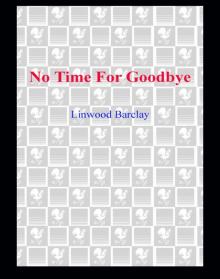 No Time for Goodbye
No Time for Goodbye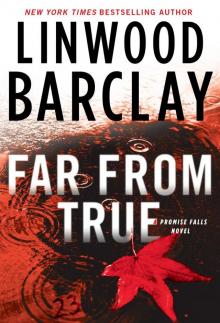 Far From True
Far From True Lone Wolf
Lone Wolf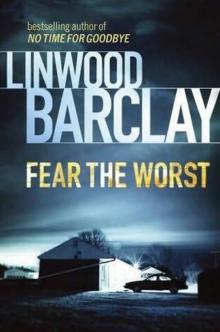 Fear the Worst
Fear the Worst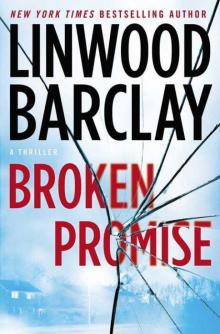 Broken Promise
Broken Promise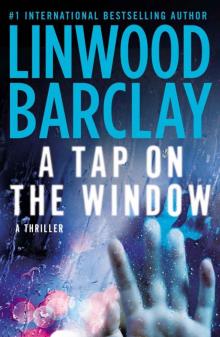 A Tap on the Window
A Tap on the Window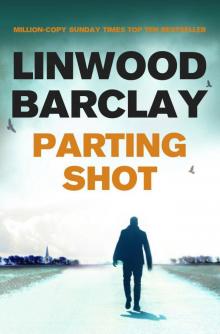 Parting Shot
Parting Shot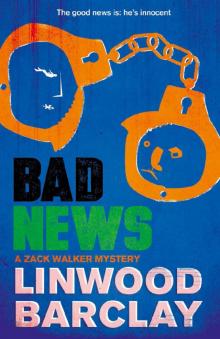 Bad News
Bad News Too Close to Home
Too Close to Home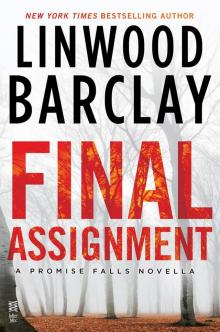 Final Assignment
Final Assignment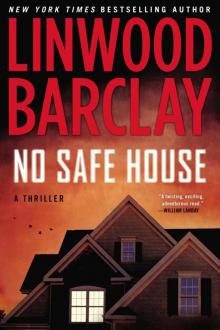 No Safe House
No Safe House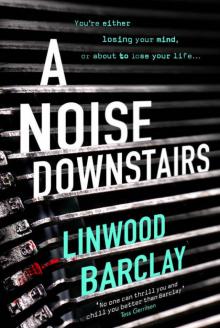 A Noise Downstairs
A Noise Downstairs Bad Guys
Bad Guys The Accident
The Accident Stone Rain
Stone Rain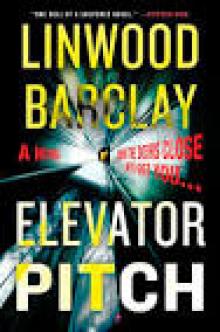 Elevator Pitch
Elevator Pitch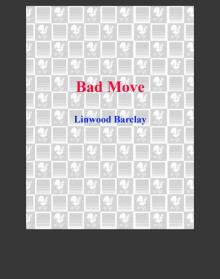 Bad Move
Bad Move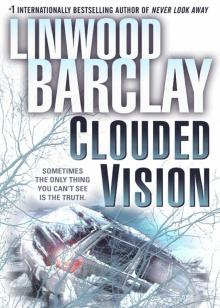 Clouded Vision
Clouded Vision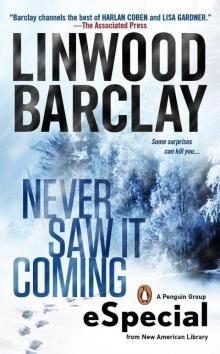 Never Saw It Coming
Never Saw It Coming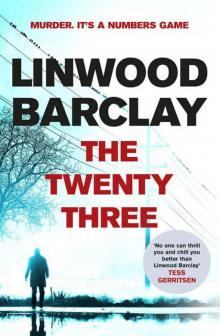 The Twenty-Three
The Twenty-Three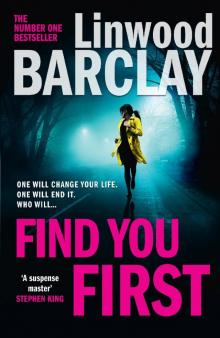 Find You First
Find You First Never Look Away
Never Look Away Elevator Pitch (UK)
Elevator Pitch (UK)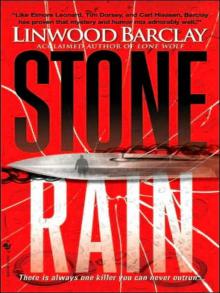 Stone Rain zw-4
Stone Rain zw-4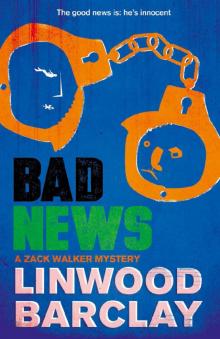 Bad News: A Zack Walker Mystery #4
Bad News: A Zack Walker Mystery #4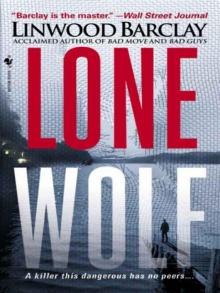 Lone Wolf zw-3
Lone Wolf zw-3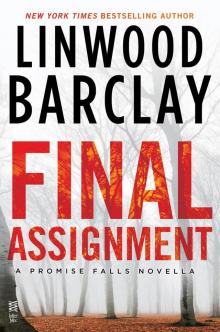 Final Assignment: A Promise Falls Novella
Final Assignment: A Promise Falls Novella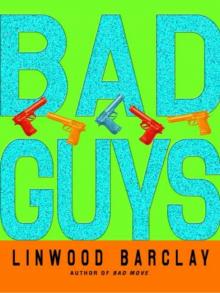 Bad Guys zw-2
Bad Guys zw-2 Never Saw It Coming: (An eSpecial from New American Library)
Never Saw It Coming: (An eSpecial from New American Library) Never Look Away: A Thriller
Never Look Away: A Thriller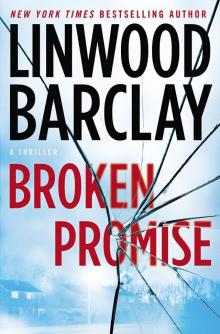 Broken Promise: A Thriller
Broken Promise: A Thriller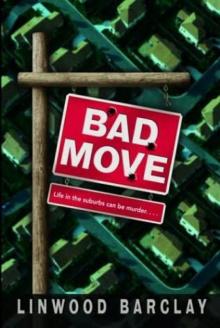 Bad Move zw-1
Bad Move zw-1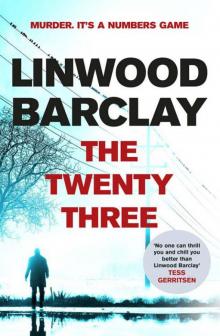 The Twenty-Three 3 (Promise Falls)
The Twenty-Three 3 (Promise Falls)